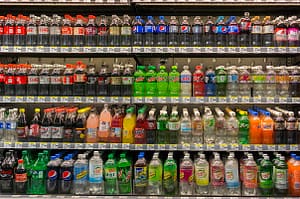Our male-about-ale Pete Brown on why there’s genuine value lurking in a pricey beer at a craft beer bar near you
How much is too much for a beer?
£4 a pint? £5? How about £12 for a large bottle?
If your answer to the above is anything other than “Well, it depends on the beer, doesn’t it?” then good news! Broader horizons and untold pleasures await you.
Back in my early days in advertising, champagne was the clichéd drink of choice. It didn’t matter what champagne, so long as it said ‘champagne’ on the label. One day I was on my way to a party where the invite insisted on bubbly. The cheapest bottle in the off-licence was £21, and I knew from (literally) bitter experience it tasted metallic and harsh. So I thought: what if I spend the same price on a bottle of still wine instead?
The freedom was exhilarating. If, like me, you buy wine for dinner parties on the basis of ‘nothing below £x, but I’m not spending more than £y,” you might identify with the giddiness I felt at shopping way outside my normal range and still feeling as if I’d got a bargain. Trading ‘down’ from champagne to wine feels like trading up, and the bottle is certainly more memorable.
So why can’t the same apply switching wine for beer? Eight quid these days gets you quite an average bottle of wine. It could get you an amazing bottle of craft ale.
And that, right there, is the point where I usually lose people in my drinks relativity argument.
We recognise that there is such a thing as a £21 bottle of wine in an off-licence and that it has an intrinsic value that might exceed cheap, overpriced champagne. But we find it much harder to accept that a particular beer might have a monetary value equivalent to a decent – or even half-decent – bottle of plonk.
Beer is a commodity. It’s been around forever. I’ve been to restaurants in several countries where beer isn’t even listed on the menu but sells more than any other drink. It’s just beer, the local beer, the same as it was last time and the same as all the other bars. Back home, it’s impossible to get people to think of beer conceptually as anything other than a pint, the price of which is as reliable an economic indicator as that of a pint of milk or a loaf of bread.
It’s strange, because any drinker knows there are some beers that are better quality than others. But we can’t get our heads around this in price terms. While we are perfectly happy with the idea that a restaurant wine list will contain some bottles that cost two or three times the amount of others that are from the same country, perhaps even the same region, and have the same alcohol content (and therefore pay the same tax) many of us would be outraged by one beer costing, say, 50p more than another simply because it’s ‘better’.
The most I’ve ever paid for a beer in a pub was £29. I paid it gladly. The beer was an extremely limited edition and I was astonished to find it. It had been aged in select oak casks for over a year, was twice the alcoholic strength of other beers, scores 92% and 100% respectively on the world’s two leading beer rating websites, and is only available in a handful of bars in this country, having been imported in scarce quantities.
This is the kind of language that would have most drinkers writers slobbering with excitement if we were talking about something made out of grapes, but show similar care and attention to produce a comparable liquid from grain and hops, and we think it can’t possibly be worth as much – even if the production process is more complicated and costly than it is for wine.
Garrett Oliver, brewmaster of Brooklyn Brewery and creator of my £29 beer, offers a refreshing, non-defensive perspective on the issue. “In France, you can spend tens of thousands of euros on an expensive wine from a chateau,” he says, “And just down the road from that chateau, you can take a plastic drum to a petrol station and fill it with cheap wine from a hosepipe for one euro a litre. The French are perfectly happy that there is cheap, everyday wine, super-expensive rare vintage wine, and everything in between. Why should beer be any different?”
Craft beer bars and some who drink in them are starting to see the point. Unfortunately, as soon as the concept of an expensive beer is credible, it gets taken too far the other way by some.
If a beer is rare, imported, took ages to make, contains more expensive ingredients, has been aged, represents greater skill than your average brewer possesses, or is higher in alcohol and therefore incurs greater duty, I’ll gladly pay £8 a pint for it (though I probably won’t order a whole pint).
If a beer has been brewed a couple of miles away from the pub by a small-scale brewery and is considerably better than your average pint, I’ll pay £4 to £5 for it quite happily, but I won’t pay £6-plus for it, especially given that the brewery is probably only seeing a fraction of the cash.
There’s a British disease where we charge ‘what the market will bear’ rather than what the product is actually worth. The problem with that is it accelerates a product life cycle: fashion-conscious people (or morons such as the City boys who regularly march into the Rake in Borough Market demanding ‘the most expensive beer you’ve got’) will pay over the odds for a time, but when the buzz has gone they’ll move on, and when they do, we’ll realise that the price of every pint has crept up now the truly phenomenal stuff has raised the ceiling. And then we go to pubs less and drink less beer overall.
So premium beer pricing is tricky to get right. And as Peroni has shown so well, ‘premium’ can be image and presentation-led as much if not more so than by the product itself.
But that doesn’t mean genuine value isn’t lurking in a pricey beer at a craft beer bar near you. Next time you fork out seventeen quid for a bottle of wine in a pub that you are deeply unimpressed by, find a bottle of beer that costs the same and approach it with an open mind. It might just be the greatest bargain you’ve ever had.
Pete Brown is the author of the newly published Shakespeare’s Local, an amusing romp through six centuries of history through the George Inn near London Bridge, watering hole to Chaucer, Dickens and the Swan of Avon. It is currently Radio 4’s book of the week. Pete is also celebrating being crowned Beer Writer of the Year for a second time.
You need to read…
Brown’s beer: Why expensive beers are way better than pricey wines
Brown’s beer: Why cider is the world’s most misunderstood drink – part one
Brown’s beer: Why I don’t subscribe to anti-alcohol hysteria this January






Leave a Comment